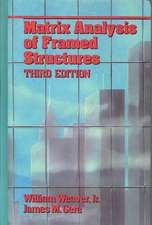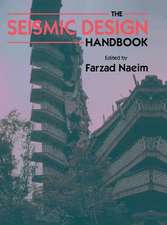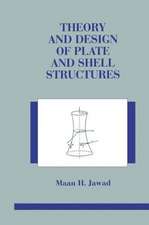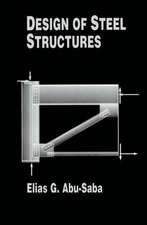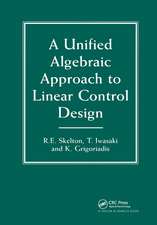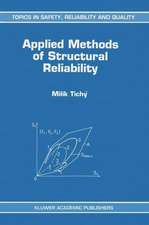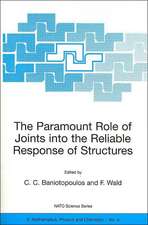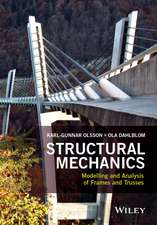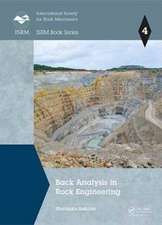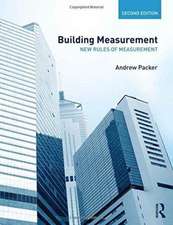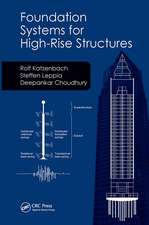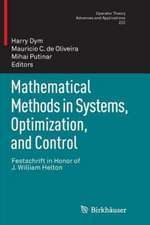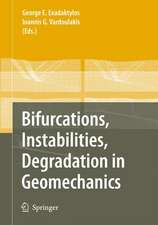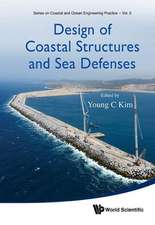Tensegrity Systems
Autor Robert E. Skelton, Mauricio C. de Oliveiraen Limba Engleză Paperback – 5 noi 2010
| Toate formatele și edițiile | Preț | Express |
|---|---|---|
| Paperback (1) | 1213.79 lei 6-8 săpt. | |
| Springer Us – 5 noi 2010 | 1213.79 lei 6-8 săpt. | |
| Hardback (1) | 1219.77 lei 6-8 săpt. | |
| Springer Us – 15 iun 2009 | 1219.77 lei 6-8 săpt. |
Preț: 1213.79 lei
Preț vechi: 1480.23 lei
-18% Nou
Puncte Express: 1821
Preț estimativ în valută:
232.25€ • 242.51$ • 191.79£
232.25€ • 242.51$ • 191.79£
Carte tipărită la comandă
Livrare economică 15-29 aprilie
Preluare comenzi: 021 569.72.76
Specificații
ISBN-13: 9781441944917
ISBN-10: 1441944915
Pagini: 232
Ilustrații: XIV, 216 p. 60 illus.
Dimensiuni: 155 x 235 x 12 mm
Greutate: 0.33 kg
Ediția:2009
Editura: Springer Us
Colecția Springer
Locul publicării:New York, NY, United States
ISBN-10: 1441944915
Pagini: 232
Ilustrații: XIV, 216 p. 60 illus.
Dimensiuni: 155 x 235 x 12 mm
Greutate: 0.33 kg
Ediția:2009
Editura: Springer Us
Colecția Springer
Locul publicării:New York, NY, United States
Public țintă
ResearchCuprins
and Motivation.- Analysis of Static Tensegrity Structures.- Design of Compressive Structures.- Design of Bending Structures.- Analysis of Tensegrity Dynamics.- Closed-Loop Control of Tensegrity Structures.
Textul de pe ultima copertă
Tensegrity Systems discusses analytical tools to design energy efficient and lightweight structures employing the concept of "tensegrity." This word is Buckminister Fuller's contraction of the words "Tensile" and "Integrity," which suggests that integrity or, as we would say, stability of the structure comes from tension. In a tensegrity structure the rigid bodies (the bars), might not have any contact, thus providing extraordinary freedom to control shape, by controlling only tendons. Tensegrity Systems covers both static and dynamic analysis of special tensegrity structural concepts, which are motivated by biological material architecture.
Drawing upon years of practical experience and using numerous examples and illustrative applications, Robert Skelton and Mauricio C. de Oliveira discuss:
The design of tensegrity structures using analytical tools
The integration of tensegrity systems into a combined framework including structural design and control design
The rules for filling space (tesselation) with self-similar structures that guarantee a specific mechanical property are provided
Tensegrity Systems will be of interest to all engineers who design or control light-weight structures, including deployable and robotic structures, and shape controllable structures. Also, Engineers interested in the study of advanced dynamics will find new and useful algorithms for multibody systems.
Drawing upon years of practical experience and using numerous examples and illustrative applications, Robert Skelton and Mauricio C. de Oliveira discuss:
The design of tensegrity structures using analytical tools
The integration of tensegrity systems into a combined framework including structural design and control design
The rules for filling space (tesselation) with self-similar structures that guarantee a specific mechanical property are provided
Tensegrity Systems will be of interest to all engineers who design or control light-weight structures, including deployable and robotic structures, and shape controllable structures. Also, Engineers interested in the study of advanced dynamics will find new and useful algorithms for multibody systems.
Caracteristici
Addresses the design of tensegrity structures using analytical tools Discusses and integrates four major topics in a combined framework: structural design; control design; sensor/actuator placement; and sensor/actuator selection Discusses the rules for filling space (tesselation) with self-similar structures that guarantee a specific mechanical property (minimal mass subject to a specific strength and stiffness constraint) Discusses the applications of tensegrity systems: in Deployable solar arrays, large mirrors and antennas, wings without hinges, robotic systems without joints and string lightweight columns, walls, bridges, and buildings


